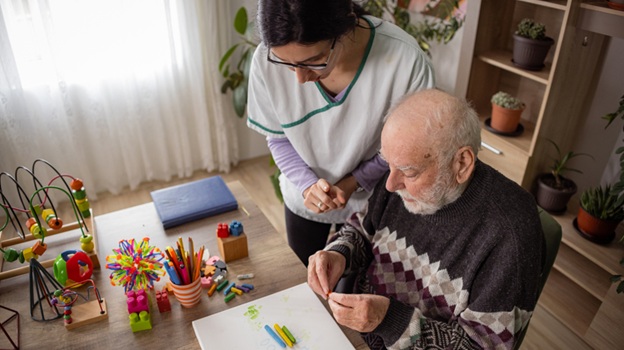While there is no cure for Alzheimer’s disease, growing research suggests that certain lifestyle changes may help slow its progression or lessen its effects. These healthy habits can support brain health, improve overall well-being, and help individuals with Alzheimer’s maintain independence for as long as possible. Whether you’re caring for a loved one or seeking ways to support your own cognitive health, these lifestyle changes are worth considering.
1. Stay Physically Active
Physical exercise is one of the most powerful tools for supporting both body and mind. Regular activity improves blood flow to the brain, reduces inflammation, and may slow cognitive decline. Studies have shown that aerobic exercises such as walking, swimming, dancing, or cycling can help preserve memory and thinking skills in individuals with Alzheimer’s.
For those with mobility challenges, even chair exercises, light stretching, or tai chi can offer benefits. The key is consistency — aiming for about 30 minutes of moderate activity most days of the week can make a meaningful difference.
2. Follow a Brain-Healthy Diet
What we eat has a direct impact on brain health. Diets rich in fruits, vegetables, whole grains, lean proteins, and healthy fats (like those found in nuts, seeds, and olive oil) are linked to better cognitive function. The Mediterranean and DASH (Dietary Approaches to Stop Hypertension) diets are frequently recommended for their brain-protective benefits.
Limiting processed foods, added sugars, and unhealthy fats can help reduce inflammation and support overall health. Cooking together, planning balanced meals, and eating mindfully can also provide opportunities for social engagement and routine.
3. Engage in Mental Stimulation
Keeping the mind active is just as important as keeping the body moving. Activities that challenge the brain — such as puzzles, reading, playing cards, learning new skills, or engaging in creative hobbies — help build cognitive reserve. This mental flexibility may slow the impact of Alzheimer’s on daily functioning.
Even small efforts, like trying a new recipe, listening to educational podcasts, or practicing a musical instrument, can help stimulate the brain. Structured group activities can also provide social interaction and a sense of accomplishment.
4. Prioritize Good Sleep
Sleep plays a critical role in memory consolidation and brain repair. Poor sleep, or conditions like sleep apnea, can accelerate cognitive decline and worsen Alzheimer’s symptoms. Creating a healthy sleep environment and routine — such as maintaining a consistent bedtime, limiting screen time before bed, and keeping the bedroom dark and quiet — can improve sleep quality.
If sleep problems persist, consulting a healthcare provider is essential. Proper treatment of sleep disorders may significantly improve quality of life for those with Alzheimer’s.
5. Stay Socially Connected
Social engagement has been shown to benefit brain health and emotional well-being. Staying connected with friends, family, and community activities can help lessen feelings of isolation and depression, both of which can contribute to faster cognitive decline.
Simple activities like sharing meals with loved ones, joining a hobby group, or attending community events can make a positive impact. In cases where individuals need support to stay engaged, companion caretakers for seniors can play a vital role by providing companionship and helping facilitate meaningful interactions.
6. Manage Stress and Emotional Health
Living with Alzheimer’s can be overwhelming and stressful, both for the individual and their loved ones. Chronic stress can negatively affect the brain and overall health. Relaxation techniques like deep breathing exercises, meditation, or gentle yoga can help reduce anxiety and promote calm.
Encouraging open conversations about feelings, seeking counseling when needed, and creating a structured daily routine can also provide emotional stability and lessen stress.
7. Promote Safety at Home
Adapting the living space can help individuals with Alzheimer’s maintain independence longer while reducing the risk of accidents. Simple changes such as adding nightlights, using labels on drawers and doors, removing trip hazards, and installing grab bars can make the home environment safer and more supportive.
A familiar, organized space helps reduce confusion and frustration, making daily activities more manageable.
While Alzheimer’s disease presents significant challenges, these lifestyle changes can help lessen its effects and support a better quality of life. By focusing on physical health, mental stimulation, emotional well-being, and a safe environment, individuals with Alzheimer’s can maintain greater independence and dignity. Families and caregivers, along with companions for seniors, can provide the necessary support to ensure these healthy habits become part of daily life.

Comments are closed.